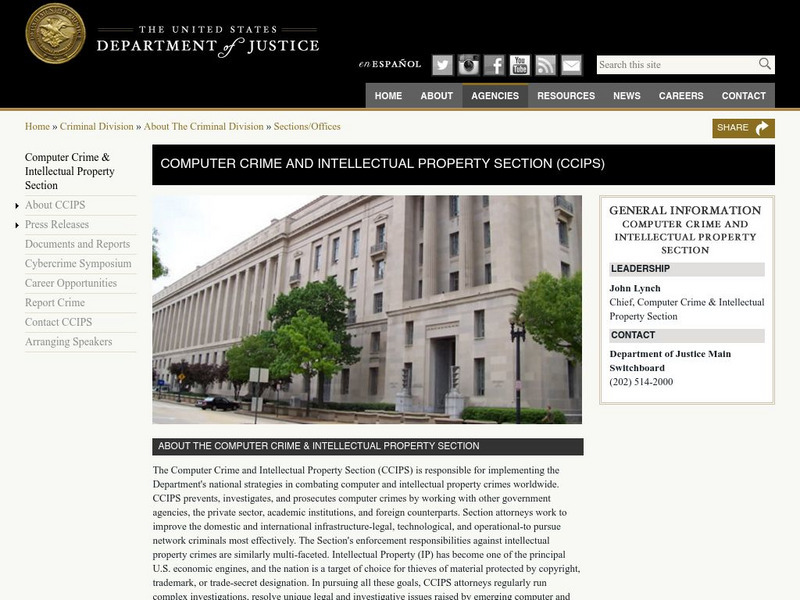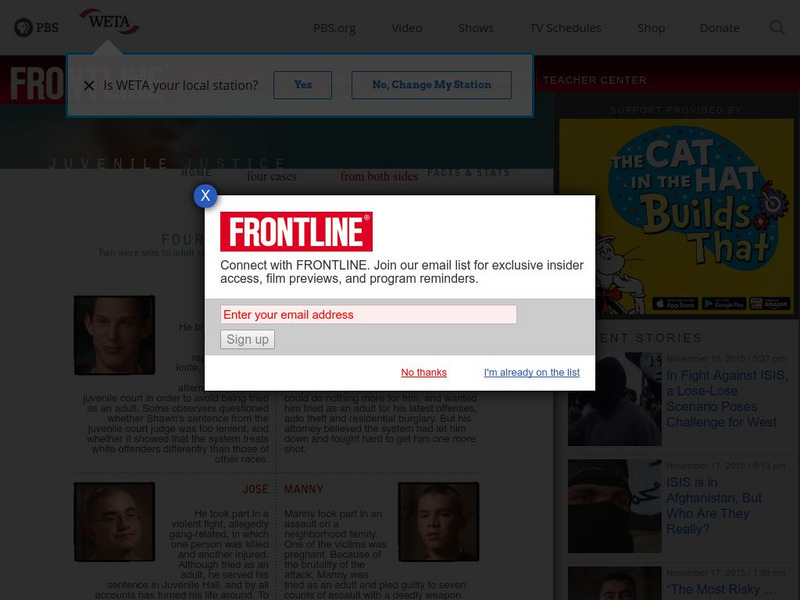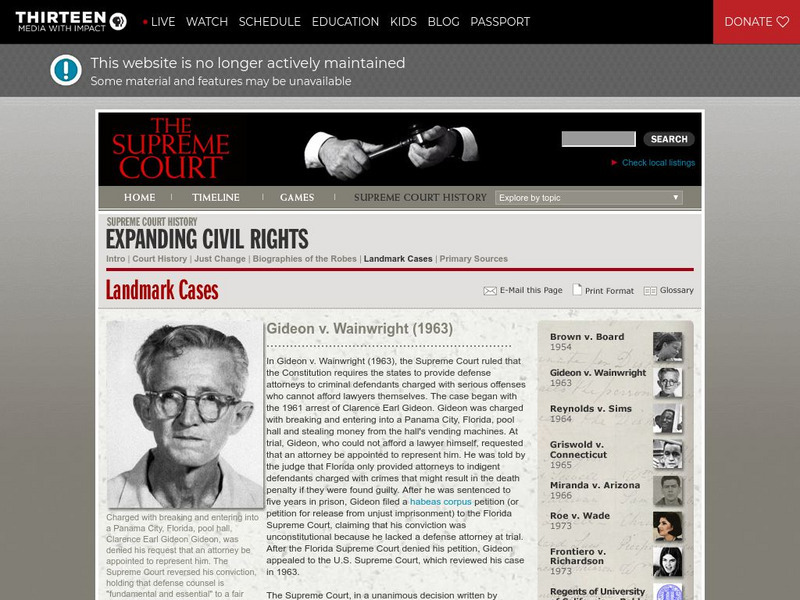Judicial Learning Center
Types of Court Cases
How can one court acquit someone of a crime, while another convicts the person of the same one? It's all because of the differences between civil and criminal trials. An informative resource provides scholars in the field of criminology...
Judicial Learning Center
Levels of the Federal Courts
The Supreme Court gets all the glory, but very few federal cases make it to the highest court. An interesting lesson explores the structure of the lower levels of the federal court system. In addition to outlining the organization of...
Judicial Learning Center
Getting Ready for Trial
A courtroom can be a scary place for the uninitiated. Get familiar with the process using a helpful overview of the activities that take place prior to both civil and criminal cases. The lesson explains the differences between...
Judicial Learning Center
The Appeal Process
Why doesn't the Supreme Court hear testimony from witnesses? How do they complete an entire proceeding in less than two hours? A helpful lesson guides scholars of criminology through these and other questions by explaining how appeals...
Judicial Learning Center
The Players in the Courtroom
Courtrooms are complicated. In addition to the many rules, there are a number of people whose jobs are not very clear to the casual courtroom observer. With the resource, individuals identify some of these roles and review more...
Judicial Learning Center
Your Day in Court
Whether out of choice or necessity, people want to know what will happen on a typical day in court. A helpful lesson walks scholars in the field of criminology through the trial process from opening statements to the final verdict.
Judicial Learning Center
The Judge and the Jury
Unless you are a lawyer, you might not understand just how unrealistic Law and Order and other legal dramas actually are. Here's a great resource to help scholars of criminology gain a more realistic perspective. The lesson outlines the...
Judicial Learning Center
State Courts vs. Federal Courts
Popular culture often portrays the Feds as the most fearsome of law enforcement agencies. Yet, someone charged with a crime is considerably more likely to end up in a state court. The lesson, one of six covering the Organization of the...
Judicial Learning Center
Your 4th Amendment Rights
Americans love to learn about their rights, especially those that protect them from the government's power to invade their privacy. Young people are especially engaged by this topic. An informative lesson explores four Supreme Court...
Judicial Learning Center
Your 1st Amendment Rights
Why should classes care about the First Amendment? An engaging lesson serves as a powerful tool for answering just that. As all four cases in the lesson relate directly to freedom of expression in schools, young scholars explore the...
Judicial Learning Center
Why Study Landmark Cases?
Why study landmark Supreme court cases? A helpful lesson offers a brief but valuable argument for the importance of these cases in the field of criminology. It introduces scholars to some key terms necessary for studying court cases and...
Judicial Learning Center
Judicial Independence
Most people support the idea of an independent judiciary in theory until they hear about a court case that violates their principles. An informative resource explains why the concept is important. It also provides scholars of criminology...
Judicial Learning Center
The Constitution and Rights
What's the right way to teach young historians about the Bill of Rights? Many an instructor has asked this question when pondering lesson plans over the US Constitution. The Constitution and Rights is a nifty resource that provides a...
Other
The Nebraska Commission on Law Enforcement and Criminal Justice
Information about the Criminal Justice System in Nebraska.
Other
Streetlaw: Criminal Law and Juvenile Justice
The chapters of this unit on criminal law and juvenile justice are as follows: "Crime in America," "Introduction to Criminal Law," "Crimes Against the Person," "Crimes Against Property," "Defenses," and "The Criminal Justice Process: The...
Other
Bureau of Justice Statistics: Victim Characteristics: Race/ethnicity
Provides downloadable reports on rates and types of criminal activity in the United States in different years and regions. Includes data on crimes against various ethnic groups and races.
University of New Brunswick (Canada)
University of New Brunswick: Crime and Punishment in New Brunswick
Two university professors in New Brunswick have created this web site that explores several historic crimes in New Brunswick and how the justice system handled the cases.
US Department of Justice
U.s. Department of Justice: Computer Crime and Intellectual Property Section
Discover information about computer crime, intellectual property, electronic evidence and other high-tech legal issues. Explore documents, reports, white papers, manuals, etc.
Other
Gouvernement Du Quebec: Justice Quebec: Judicial System
This site explains the provincial court system of Quebec.
PBS
Pbs: Frontline: Juvenile Justice
Read case profiles of several juvenile criminals, many who have been tried as adults. Includes personal background information on each individual, and a discussion of their sentencing.
City University of New York
John Jay College of Criminal Justice: Atomic Structure
Resource shows the relationships bewteen terms such as atomic number, protons, and isotopes. Simple pictures of atoms help.
Other
Innocence Project
Information on cases that have resulted in exoneration of innocent individuals convicted of crimes. Updated daily.
Other
Classroom Law Project
This resource archive serves as resource for students and teachers for reference for multiple law topics including: the Census, presidential impeachment process and criminal justice reform.
PBS
Wnet: Thirteen: Supreme Court: Expanding Our Civil Rights: Gideon v. Wainwright
This is a synopsis of the landmark Supreme Court case of Gideon v. Wainwright, which ruled that states must provide defense attorneys to any indigent criminal defendant charged with a felony. The decision was written by Justice Hugo Black.
Other popular searches
- The Criminal Justice System
- Criminal Justice Worksheets
- Criminal Justice Procedure
- Criminal Justice Jury
- Criminal Justice Corrections
- Criminal Justice Projects
- Ethics in Criminal Justice
- Criminal Justice Process
- Lessons on Criminal Justice
- Criminal Justice Lesson Plan
- Criminal Justice Activities
- Criminal Justice System,



















